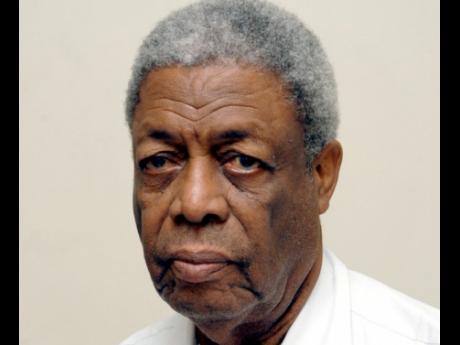Former Gleaner editor-in-chief, Ken Allen, passes
Former editor-in-chief of The Gleaner, Ken Allen, has died.
He passed away earlier today at The University Hospital of the West Indies after a short illness.
Allen died five days shy of his 88th birthday, which he would have celebrated on January 29.
Ken Allen's relationship with The Gleaner spanned some 69 years.
He started as a sub-editor with the newspaper in 1952, after responding to an advertisement by the company for journalism trainees. He was 19 years-old at the time and had only recently left Cornwall College in St James.
A master of the English Language, he was comfortable with sub-editing, but soon honed his reporting skills on a range of subject matters, including crime reporting, after being placed on a host of assignments by the paper and trained by the famous crime reporter, George Daley, for whom he substituted when Daley took leave.
Allen rose rapidly at The Gleaner, reporting for daily paper and what was then its young tabloid, The Star. He was chosen by the newspaper to manage, what was described at the time as a "one-man bureau" in Portland and St Thomas. He described the experience as his most enjoyable at The Gleaner, “because you were left to your own devices and were your own boss. I had some exciting times covering the countryside.”
In 1957, Allen was the first Caribbean journalist to receive the Inter-American Press Association (IAPA) scholarship and was admitted into the master’s programme at the Columbia University School of Journalism in New York in the United States, although he did not hold an undergraduate degree.
After successfully completing his master’s degree, he entered the School of General Studies at Columbia to earn his bachelor’s.
He rejoined The Gleaner after five years of study, which had regarded his tenure as unbroken, and was assigned to cover parliament and politics as well as labour. These beats were considered the most prestigious in Jamaican news reporting.
Allen rose to the position of associate editor in the early 1970s, where he was put in charge of several young reporters, whom he mentored and assisted with developing their skills. He also vetted the paper's daily editorial and columns and, for a period, also prepared a weekly parliamentary page.
Unhappy with political perceptions; standard of journalism
During this period, Allen grew unhappy with the expanding media landscape and especially the perception on the left of the political spectrum that The Gleaner was hostile to the People’s National Party (PNP) and favoured the Jamaica Labour Party (JLP). Alienation of The Gleaner from the left reached its apogee, after Michael Manley led the PNP to victory in the February 1972 general election, and, in the middle of its first term, reaffirmed its democratic socialist philosophy.
On September 24, 1979, a fired-up Manley led a march on The Gleaner’s North Street office and accused the company of misrepresenting a speech he made at the Non-Aligned Summit in Havana, Cuba, earlier that month.
Allen noted that it was the first time press freedom in Jamaica was openly challenged.
“You had to be careful on the streets. If people saw you taking notes anywhere, you could become a target,” he said.
Allen was also unhappy about what he perceived to be a decline in the standard of journalism and the availability of skilled persons, despite the growth and diversification of the media landscape in Jamaica and the establishment of, what was then, the Caribbean Institute of Media and Communication at The University of the West Indies.
He was appointed editor-in-chief of The Gleaner in 1992. During his leadership, he sought to lift standards by employing teachers of the English Language, but grew frustrated, criticising the general malaise in the education system.
He proceeded on to early retirement two years later, but retained a contract as the newspaper's opinion page editor, where he maintained purview of editorials, columns and letters to the editor.
For his contributions to journalism, in 1988, Allen was conferred with the Order of Distinction, Commander Class (CD) by the Government of Jamaica; and in 2002- his 50th year in journalism- he was honoured by the Press Association of Jamaica for outstanding service to journalism in Jamaica.
Follow The Gleaner on Twitter and Instagram @JamaicaGleaner and on Facebook @GleanerJamaica. Send us a message on WhatsApp at 1-876-499-0169 or email us @onlinefeedback@gleanerjm.com or editors@gleanerjm.com.



